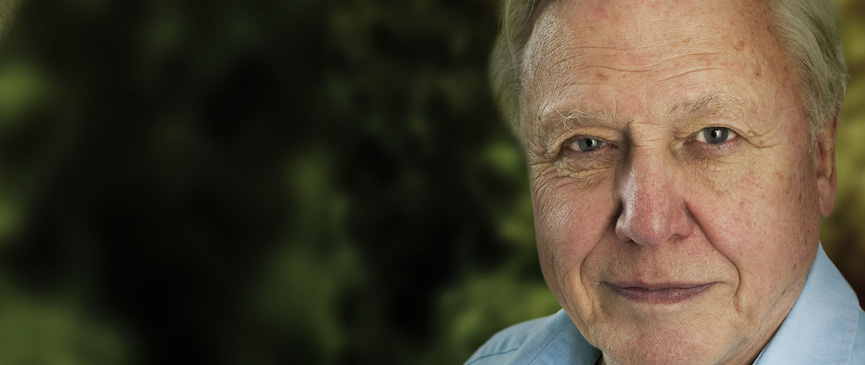You are in:
Laureates
Start of main content
David Attenborough
Prince of Asturias Award for Social Sciences 2009

David Attenborough (London, Great Britain, 1926) obtained a degree in Natural Sciences from the University of Cambridge in 1947 and, after serving in the Army, in 1952 he began to work for the BBC, a network that is at the forefront of documentary filmmaking and where he spent most of his career. In 1954 he launched the popular programme Zoo Quest, which took him on expeditions throughout the world for ten years. In 1965 he became controller of BBC 2 and was responsible for the arrival of colour television in the United Kingdom. He was the BBC’s Director of Programmes from 1969 to 1972 and is currently President of the Royal Society for Nature Conservation, fellow of the Royal Society of London and trustee of the British Museum and the Royal Botanic Gardens, Kew.
Attenborough returned to programme making in 1973, producing over twenty wildlife programmes such as Eastwards with Attenborough and The Tribal Eye. In 1979 he wrote, directed and presented what was then considered one of the most ambitious series of documentary films produced by the Nature Department of the BBC: Life on Earth. More that 500 million people have watched this series, which consists of 13 episodes and is considered by historians as a breakthrough in the divulgation of science to the general public.
This series was followed by others such as The Living Planet (1984), The Trials of Life (1990), Life in the Freezer (1993) and The Private Life of Plants (1995). To commemorate 40 years of the Nature Department of the BBC he presented Wildlife Specials in 1997. Standing out amongst his latest work are The Life of Birds (1998), State of the Planet (2000), The Blue Planet (2001), The Life of Mammals (2002), Life in the Undergrowth (2005), Planet Earth (2006) and Life in cold blood, a series of documentaries on reptiles and amphibians that was broadcast in 2008.
On the occasion of his 80th birthday he went to the Galapagos Islands to film the archipelago’s giant turtles. His audiovisual turnout has been on a par with his published books, where the educational nature of his work has also been captured in such titles as Zoo Quest to Guyana (1956), Quest in Paradise (1960), The Tribal Eye (1976), Life on Earth (1979), The Living Planet (1984), The First Eden (1987), The Trials of Life (1990), The Private Life of Plants (1994), The Life of Mammals (2002) and Life in the Undergrowth (2005). Life on Air (2005) is an autobiographic account of his entire career.
He collaborates with the World Land Trust, a non-profit environmental organisation that purchases tracts of land and tropical forests for the conservation of the animals that live in these areas, since its creation in 1989, and is a patron since 2003. World Land Trust has helped acquire and protect over 1,214 square kilometres of habitats rich in fauna and flora in Belize, Costa Rica, the Philippines, South America and the United Kingdom.
Queen Elizabeth II of England, who in 2005 gave him the Order of Merit, named him a Knight of the British Empire in 1985. He has received honorary degrees from several universities and has been awarded the Royal Television Society Silver Medal and the Zoological Society of London Silver Medal, as well as the Philadelphia Academy of Natural Science Hopper Day Medal and the Royal Geographical Society Founder's Gold Medal. He has also been awarded the Royal Scottish Geographical Society Livingstone Medal and the Royal Society of Arts Franklin Medal (US). He has received the UNESCO Kalinga Prize (1981), an International Emmy Award (1985), the Golden Kamera Award (Germany, 1993) and the Royal Society of London’s Michael Faraday Prize (2003). The following year he received the European Commission’s Descartes Prize for Science Communication. In 2007 he was honoured with the Institute of Ecology and Environmental Management’s Medal and went on to receive honorary degrees from the British universities of Aberdeen, Exeter and Kingston.
End of main content
Sección de utilidades
Fin de la sección de utilidades
- Legal document Legal document (Access key 8)
- | Privacy policy Privacy policy (Access key )
- | Social networks ???en.portal.pie.menu107.title???
- | Cookies ???en.portal.pie.menu110.title???
- | Site map Site Map (Access key 3)
- | Contact Contact (Access key )
- | XHTML 1.0
- | CSS 2.1
- | WAI 'AA
© Copyright 2024. FUNDACIÓN PRINCESA DE ASTURIAS
 View interactive
View interactive


